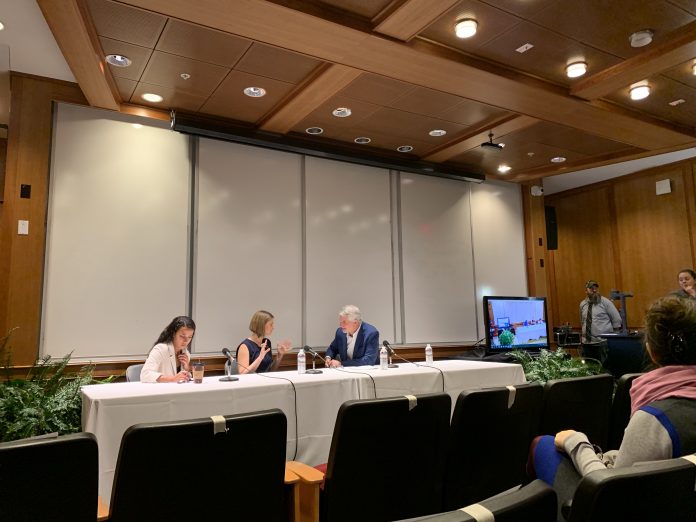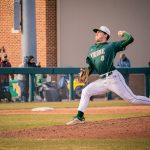
Thursday, Nov. 7, the Global Research Institute’s Teaching, Research and International Policy Lab hosted a panel discussion at the College of William and Mary devoted to exploring foreign policy journalism in the era of President Donald Trump. The panelists included journalists from diverse areas of the field, all of whom demonstrated varying approaches to journalism in the realms of foreign policy and national security.
CNN Analyst and Senior Fellow at the Brooking Institution Susan Hennessey spoke as one of the panelists. Hennessey also serves as the executive editor of the Lawfare Blog, a forum for discussion on foreign policy and legal issues. Akela Lacy ’15, a political reporter at The Intercept, served on the panel and discussed her focuses in politics, elections, criminal justice and immigration.
Lastly, Hennessey and Lacy were joined by David Sanger, a national security correspondent and senior writer for The New York Times. He has been a member of three Pulitzer Prize winning teams over the course of 36 years with the Times, and his areas of expertise range from nuclear proliferation and cyberconflict to national security. Sanger joined the panelists remotely from New York City. In addition to the panelists, the conversation was moderated by professor Mike Tierney.
The discussion encompassed a wide range of topics and questions essential to understanding how journalism operates in the current political climate. Much of the conversation focused on how journalism has taken on a new form in recent years, now that sources, classified documents and expert knowledge serve different purposes under this unusual administration. Hennessey questioned the normalcy of the current U.S. political climate, emphasizing that it is important to examine today’s geopolitical situation in the context of other administrations.
“You need to not just give a fair rendering of the law, precedent and long-term institutional position, but you also need to step back and situate it in the larger and unprecedented moment that we’re seeing in terms of the big, strategic positions that this White House is taking on the question of executive power,” Hennessey said.
“You need to not just give a fair rendering of the law, precedent and long-term institutional position, but you also need to step back and situate it in the larger and unprecedented moment that we’re seeing in terms of the big, strategic positions that this White House is taking on the question of executive power,” Hennessey said.
Sanger remarked that oftentimes he rereads his articles, and in the place of Donald Trump, he inserts the names of other presidents to examine how feasible or acceptable a given presidential action could be.
Hennessey also connected this new era of journalism to transformed public participation. She noted that there has been a surge in desire for primary sources, and that the Trump administration has spurred journalists to engage with a wider audience. When asked whether the newly sparked interest in primary sources is the result of distrusting the press or craving information, Hennessey seemed optimistic and stressed that there is not necessarily eroding trust in journalism.
“Part of it is just an awakening of the importance of civic responsibility to develop media literacy to understand what is going on,” Hennessey said. “There is a different sort of discourse that occurs in the soundbite economy. We can lament it as the degradation of serious scholarship and intellect, but on the other hand it is a significant opportunity space for people to think about how to engage.”
“Part of it is just an awakening of the importance of civic responsibility to develop media literacy to understand what is going on,” Hennessey said. “There is a different sort of discourse that occurs in the soundbite economy. We can lament it as the degradation of serious scholarship and intellect, but on the other hand it is a significant opportunity space for people to think about how to engage.”
As a young journalist working for a different kind of news outlet, Lacy offered insight concerning shifts in foreign policy journalism.
“The way international relations shows up in the news has changed a lot since I graduated school,” Lacy said. “A lot of the issues we see are covered through the White House. Something we talk a lot about is the lack of international coverage in domestic outlets. I think foreign policy coverage has increased, but not necessarily in the way that people in that space would want.”
Lacy also commented on The Intercept’s commitment to diversifying perspectives and expanding issue areas — areas of concern that speak to the desires of young activists who question the current definition of what an expert is.
The conversation quickly shifted to more current developments in foreign policy, including the impeachment inquiry concerning Ukraine and President Trump’s decision to remove troops from northern Syria. Hennessey commented that the arguments driving impeachment are simple at their core but could hold major domestic consequences. She made the argument that impeachment is overly legalized and should instead be a method for removing a president who is not acting in the public’s interest.
When the topic of President Trump’s military decisions came up late in the discussion, Louie Hall ’22 asked the panelists how the discord among Trump officials on the removal of U.S. troops from Syria affects relations with U.S. allies. He noted that this dialogue was playing out over media outlets, specifically Fox News, instead of more traditional platforms. Hall reiterated the response he received to his question with the focus on the long-term implications.
“Because of the fact that we swiftly left Iraq and now we’re leaving the Kurds in northeastern Syria, it could be hard for allies to trust us in the future,” Hall said.
Hall noticed that there were differences in opinion among the journalists, particularly during their discussion of sources in contemporary journalism.
“I thought it was interesting how we had a panelist from The Intercept who was talking about transparency, there was another who was talking about how the intelligence community needs to keep the culture of not revealing so much, and we had another who said that we live in the age of over-classifying things,” Hall said.
Patrick Schroeder ’23 appreciated the discourse on the effects of President Trump’s rhetoric on American foreign policy goals.
“I really liked the point about the change in demeanor towards authoritarian leaders and how that relates to the uptick in authoritarian leaders across the globe,” Schroeder said. “Donald Trump’s attitudes towards them have really changed the way that Americans are viewing the way a president should act and changed the way countries view the president’s role and the attitude of America at large,” Schroeder said. “A big point that was touched upon was how important it is for journalists to rise above that and highlight how different the time is right now.”



































